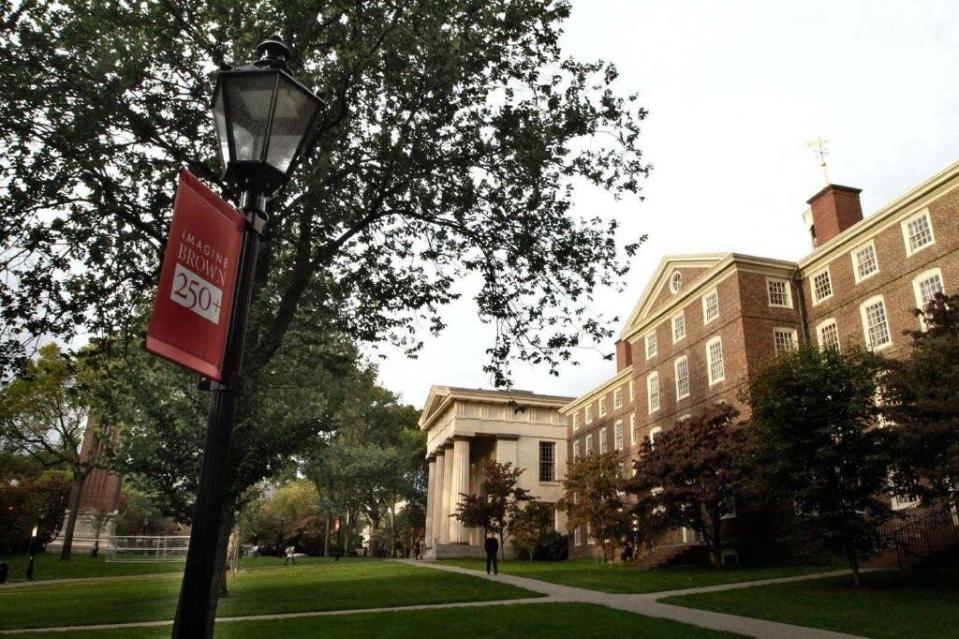Bills would tax properties, endowments of RI colleges, universities
PROVIDENCE — Lawmakers are trying once again to push Rhode Island’s private colleges and universities to pay taxes to their host communities.
But the schools are saying no to legislation that would force their hand.
On Thursday, Rep. David Morales and Sen. Tiara Mack, both D-Providence, held a news conference alongside City Councilman John Goncalves and local activists, all of whom are backing two House bills: one that would permit the taxation of property of private higher education, and another that would permit the taxation of endowments.
Proceeds from the taxation of property would flow to the host community's general fund. Proceeds from the taxation of endowments would be reserved for the host community's public schools.
“We are at a crossroads where legislative accountability is necessary and long overdue,” said Morales, who is sponsoring the bills. He takes aim at Providence’s colleges, in particular Brown University.
Election 2022 Update: The latest news in the highest-profile 2022 races in Rhode Island

Morales contends that “wealthy private universities have taken advantage of our community by continuously expanding their tax-exempt footprint, which in turn has led to gentrification, the displacement of working people, and most of all, forcing Providence to manage essential city services … with a limited tax base.”
How much would institutions pay if taxed?
The legislation, which is enabling, does not stipulate at what rate endowments would be taxed, but it has a 2% cap. If passed, it would mean a big payout from Brown. As of October, the university’s endowment had a market value of $6.9 billion. A 2% tax would generate $138 million for the city. Citing the latest property valuations, Morales said Brown would pay $49 million in property taxes if it was not tax-exempt.
Other institutions would generate far less. As of fiscal year 2021, the Rhode Island School of Design, which Morales said would owe $11 million in property tax if it was not tax-exempt, had a nearly $443 million endowment. Providence College, which Morales said would owe $16.2 million in property tax, had an endowment totaling more than $294 million as of April 2021. No recent valuation was immediately available for Johnson & Wales University, which Morales said would owe roughly $12.5 million in property tax.
Goncalves, who represents Fox Point, an area that neighbors Brown and RISD, spoke in support of collecting those amounts, reflecting on shifts in his neighborhood over generations.
“Right in Fox Point, for decades and decades there was a vibrant community of Irish, Portuguese and Cape Verdean immigrants,” Goncalves said. “The majority of those families, including my own, that lived in that neighborhood for decades are completely gone. They’ve been priced out of the neighborhood by college students, and as a byproduct of unbounded university expansion.”
Income tax: School and labor unions, advocacy groups push tax hike for Rhode Island's top-earners
Colleges say proposals discount their contributions
Dan Egan, president of the Association of Independent Colleges & Universities of Rhode Island, which represents all institutions that would be affected by the legislation, described it as “counter practice” to the benefits of being tax exempt as a nonprofit.
Egan emphasized that passing the bills would create “an outlier situation” for Rhode Island, as tax-exempt status is granted to colleges and universities in every state.
“Quite frankly, there’s a fear that any endowment tax might actually limit our ability to fundraise,” Egan said, pointing to Roger Williams University’s recent announcement of a $20-million partnership with the philanthropic Cummings Foundation and asking, “Would a donor like that reconsider that because Rhode Island would have a tax on that endowment gift?”
Egan also said the tax would place Rhode Island’s schools at a competitive disadvantage when it comes to education.
“To put a cost that we don’t currently have that would really have an impact on operations undermines the value of a sector that’s the second largest employment sector in the state [and] brings a lot of economic vitality to the state,” he said.
Brown spokesman Brian Clark echoed Egan’s message, arguing that taxes would become an impediment to Brown’s work.
“Each year we spend funds from our endowment to support this critical work that benefits Providence and Rhode Island,” Clark said. “We oppose both the effort to tax properties used for the academic activity that enables universities like Brown to benefit the local economy so extensively, as well as the tax on charitable giving to institutions that contribute to the public good in significant and enduring ways.”
This article originally appeared on The Providence Journal: RI looks to tax endowment, property of colleges and universities

